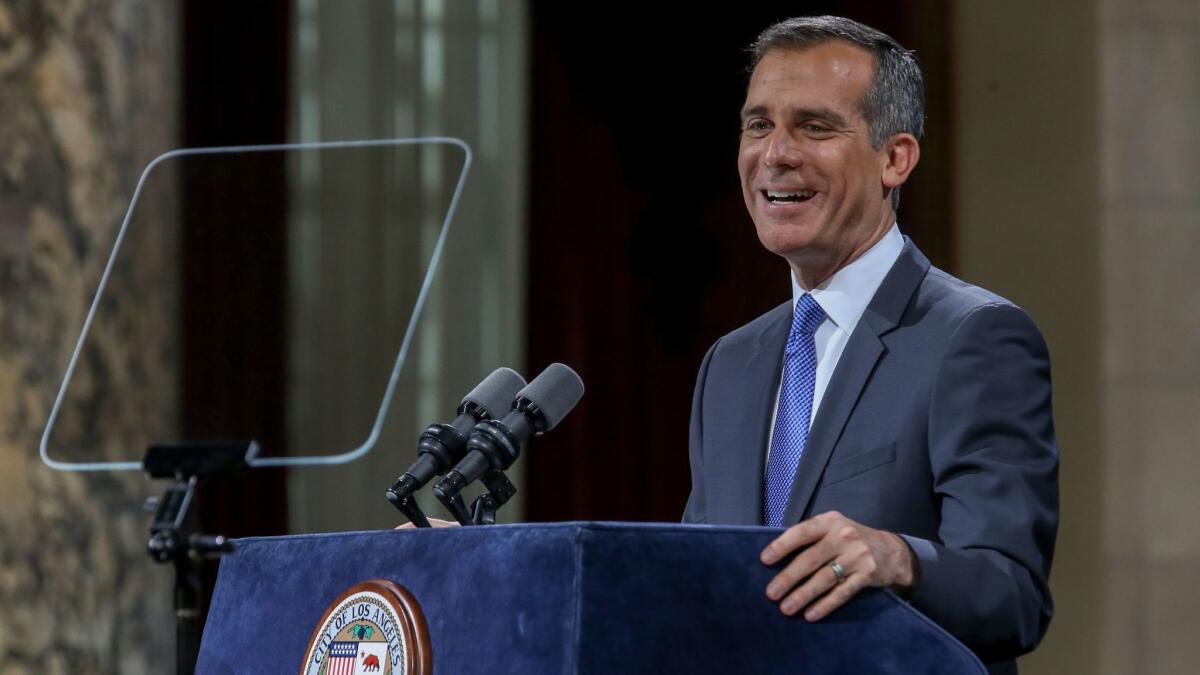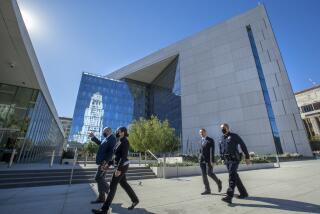The billion-dollar budget item Garcetti didn’t mention in his State of the City speech

- Share via
When Los Angeles Mayor Eric Garcetti unveiled his proposed budget last week, he called a $176-million effort to battle homelessness his top priority, highlighted a $35-million plan to mend broken streets and promised $2 million to clean up graffiti.
He did not mention the expenditure that dwarfs all of those combined: more than $1.1 billion to pay for city employees’ pensions and healthcare after they retire.
For the record:
4:44 a.m. April 30, 2025A previous version of this article referred to Jack Humphreville as a member of the North Wilshire Neighborhood Council. It is the Greater Wilshire Neighborhood Council.
The cost of retiree benefits amounts to nearly 20% of the city’s general fund, which pays for basic city services. In 2002, the figure was less than 5%.
“Every municipal government is feeling this pain,” said Joe Nation, a former Democratic state legislator who teaches at Stanford’s Institute for Economic Policy Research.
“But 20% is a pretty big number to be spending on pensions,” he added.
Garcetti, like most civic leaders in California, inherited crippling pension promises made by his predecessors, and there’s little he can do to lower that cost in the near future.
Without major reform in Sacramento, or a groundbreaking win in the courts, the annual billion-dollar pension bill is something Angelenos have to live with, like bad traffic and the threat of earthquakes. And it keeps climbing — up nearly $18 million since last year.
Pension costs for government employees are high across the country, but they’re particularly burdensome in California, where in the early 2000s political leaders guaranteed public sector workers early and generous retirements and promised that stock market gains — not taxpayers — would pay for it all.
The plan was for governments to invest relatively small sums in what were then booming financial markets and the money would grow fast enough to cover big pension payments by the time the employees retired.
The investment gains didn’t materialize — they were wiped out by the bursting of the dot-com bubble and the collapse of the housing market. Now taxpayers, most of whom have little set aside for their own retirements, are on the hook for their public servants’ guaranteed pensions.
In most of California, including Los Angeles, civilian employees were promised they could retire at 55 with more than half of their salary guaranteed for life. Police and firefighters were promised they could retire at 50 with up to 90% of their highest salary guaranteed.
Garcetti spokesman Alex Comisar noted that, in his first term, Garcetti negotiated a three-year freeze on raises for city employees. Because the size of a pension check is based on the employee’s final salary, that helped slow the growth of pensions costs.
But the freeze ends this year, and the upcoming raises will drive the pension bill still higher.
Other reforms enacted by the city in 2011 and 2012, which included lowering pensions for new employees and requiring workers to contribute more of their salaries toward their retirements, have at best slowed the growth of the city’s pension costs.
Real savings won’t show up until those new employees start to retire.
“That strategy works if your objective is to solve this problem in 30 years,” Nation said.
Major change that could have an immediate impact, like such as reducing pensions for most current employees or switching them to far less expensive 401(k) plans, is legally fraught.
A body of court decisions known as the “California rule” prohibits employers in the state from making any reduction to the retirement promises offered on an employee’s first day of work.
Appeals courts have recently ruled in favor of two California government agencies that challenged the rule.
Marin County tried to stop late-career “pension spiking” by refusing to count toward pensions extra pay workers receive for various on-call duties and for declining health insurance.
The unions sued and lost.
On appeal, the three-judge panel unanimously agreed that pension benefits can be reduced.
“While a public employee does have a ‘vested right’ to a pension, that right is only to a ‘reasonable’ pension — not an immutable entitlement to the most optimal formula of calculating the pension,” Justice James A. Richman, of California’s 1st District Court of Appeal, wrote last August.
The case is now before the state Supreme Court. A ruling in Marin County’s favor would give governments across the state much more room to negotiate with employee unions.
In the meantime, Garcetti used his State of the City speech on Thursday to highlight the millions he’s planning to spend to clean up neighborhoods while ignoring the billion-dollar elephant in the room.
“It’s such an important issue,” said Jack Humphreville, a blogger and member of the Greater Wilshire Neighborhood Council, who attended the speech. “I don’t know why he doesn’t talk about it.”
Times staff writer David Zahniser contributed to this report.
Twitter: @JackDolanLAT
ALSO
To know whether California’s budget will balance, watch this month’s tax collections
Garcetti now has a mandate — but how he will use it has City Hall and the political world guessing
UPDATES:
12:30 p.m.: This article was updated to include the percentage of the general fund taken up by retiree costs in 2002.
This article was originally published at 6 a.m.
More to Read
Sign up for Essential California
The most important California stories and recommendations in your inbox every morning.
You may occasionally receive promotional content from the Los Angeles Times.











